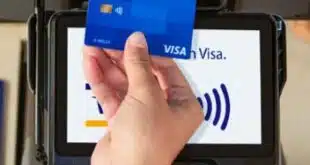The Isis smart-phone-based payments machine is finally getting in gear, observers say, in the wake of several recent developments involving the service that is jointly owned by three big mobile-telecommunications carriers. Giant card issuer JPMorgan Chase & Co. on Monday said that several of its cards will support the Isis wallet. Last week, American Express Co. said it would add its Serve platform, which provides under- or unbanked consumers with payment services, to Isis. Both announcements came shortly after Isis, which uses near-field communication (NFC) as its technological core, said it would go national later this year after tests in Austin, Texas, and Salt Lake City.
“Isis is definitely on a roll here,” mobile-payments researcher Rick Oglesby, a senior analyst at Boston-based Aite Group LLC, tells Digital Transactions News by e-mail. “Bringing Chase on board is obviously major as they are a huge issuer. The integration of AmEx Serve is also quite big as it gives Isis another strategic partner with extensive consumer relationships and consumer-marketing capabilities, plus the ability to support lots of new capabilities that are not native to a standard NFC wallet.” Such capabilities can include e-commerce wallet support, cloud-based payments, card-based payments, and person-to-person payments, he says.
In one respect, the Chase and AmEx developments are not unexpected. Chase, which has $110 billion in credit card receivables, participated in the Salt Lake and Austin pilots, as did AmEx with its consumer and small-business cards. Isis’s other announced issuer partners during the test, Capital One Financial Corp. and Barclaycard, haven’t said yet what they will do with Isis going forward.
“I don’t think anybody should be surprised that they’ve extended their relationships with these issuers to the national rollout,” says mobile-payments consultant Todd Ablowitz, president of Centennial, Colo.-based Double Diamond Group, by e-mail.
Holders of Chase Freedom, Chase Sapphire, Chase Slate, and JPMorgan Palladium cards will be able to load their cards into the Isis wallet and tap their smart phones to pay at point-of-sale locations that accept contactless payments.
“Based on the positive results in Austin and Salt Lake, we are pleased to expand our relationship with Isis and provide Chase cardholders nationwide with another quick, convenient, and secure way to use their credit cards for everyday spending while on the go,” Richard Quigley, president of Chase Card Services, said in a statement.
Neither Chase nor Isis would comment beyond Chase’s statement. The announcements, however, may demonstrate that Isis is getting some traction after a slow start in the tests that began last October. Isis has said that, on average, active Isis users tap more than 10 times per month and that two-thirds of them opted in to receive offers and messages from an average of seven brands. An advantage to NFC technology is its ability to facilitate loyalty programs and electronic coupons in addition to payments.
“To roll out something on this scale, one of the most important qualities you have to have is to be resolute,” says Ablowitz. “No one can say Isis isn’t resolute.”
Isis, however, hasn’t said how many consumers participated in the two-city tests or how much they charged. Nor has it given many details about the planned national rollout, which will start later this year.
“Given the scope of this effort, there will not be one date, but rather a series of actions across our various partners to ensure a seamless customer experience,” an Isis spokesperson says by e-mail. “For example, merchant terminal deployments, sales-rep education, etc. One of the important lessons we learned in our pilots was around getting the initial experience right.”
Isis says 4,000 locations in the two test cities accept contactless payments.
Isis mobile payments can happen where contactless debit or credit cards are accepted, but many of its current locations are vending machines. Anecdotal evidence indicates that brick-and-mortar merchants in Austin and Salt Lake so far aren’t getting many Isis transactions from NFC-enabled smart phones.
“We still haven’t seen consumer adoption at scale; this will be the big challenge left,” says Oglesby. “Isis is bringing along may of the right partners that can help make that happen. They’ve clearly got a product that is of interest to financial institutions and to payment networks, now they need to nail the consumer and merchant value drivers. The key is getting all four legs of the stool; if they can do that then they will really have something.”
Oglesby adds that Isis will benefit from the payment card networks’ push to get Europay-MasterCard-Visa (EMV) chip cards adopted in the U.S. Meanwhile, the relatively low number of NFC-enabled smart phones in the U.S. is growing rapidly, but Apple Inc. with its popular iPhone so far has resisted adding NFC capability.
“Their challenges are many,” says Ablowitz. “They have to get an active merchant base, they have to get a broad and consistent user base, and they have to win over the remaining handset maker, Apple.”
Ablowitz also notes that Isis will soon face competition from another non-bank mobile-payments player, the retailer-backed Merchant Customer Exchange, or MCX. It’s not yet clear if there’s room for both systems in a single store if the store is an MCX owner. “MCX, the merchant-led offering, has been very much discussed and they have some very committed co-owners who are merchants,” he says.
Isis’s owners are the mobile networks AT&T Mobility, T-Mobile USA, and Verizon Wireless.






